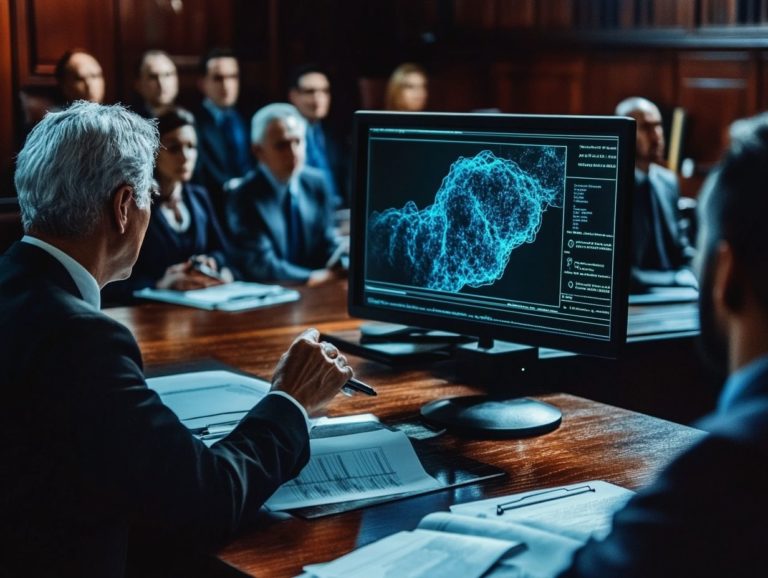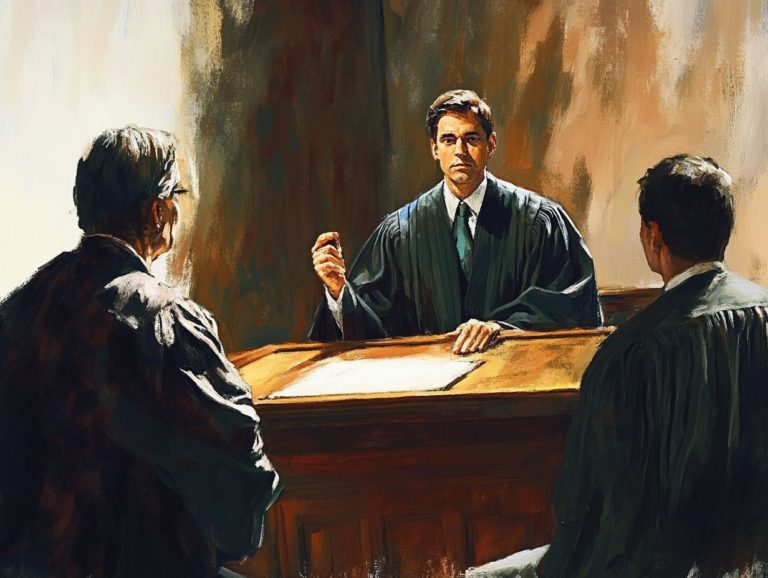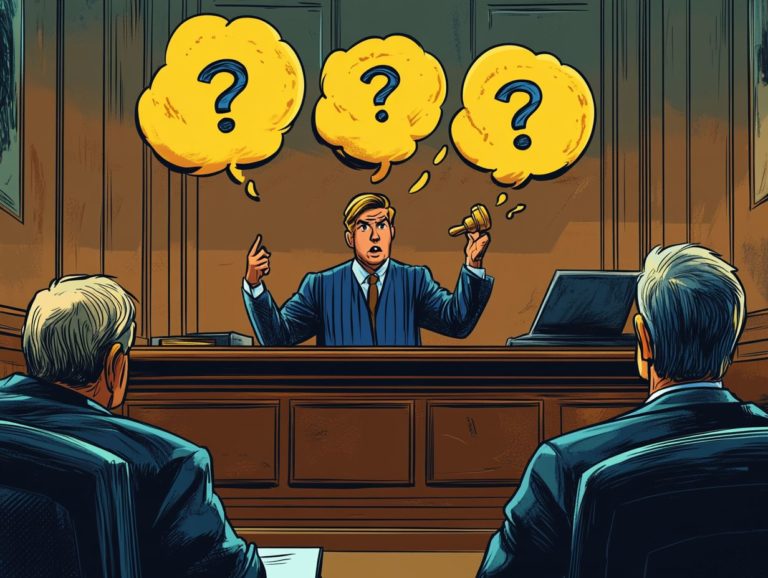How Mental State Affects Criminal Defense
Understanding the relationship between mental health and criminal behavior is essential for anyone navigating the complexities of the legal system. This critical journey reveals how psychological conditions can shape criminal liability and responsibility.
This article delves into various mental health conditions frequently encountered in criminal cases, examining their impact on both the accused and the justice process. You’ll discover how a defendant’s mental state can influence charges, the critical role of mental health evaluations, and the defenses available based on these conditions.
Mental health treatment is crucial for achieving fair outcomes that cannot be overstated. Join in as you explore and unpack these intricate connections.
Contents
- Key Takeaways:
- Understanding the Connection
- Mental Health Conditions and Criminal Behavior
- The Impact of Mental State on Criminal Defense
- How Mental State Can Affect Criminal Charges
- Mental Health Evaluations in Criminal Cases
- Defenses Based on Mental State
- Insanity Defense and Other Mental State Defenses
- The Importance of Mental Health Treatment in Criminal Cases
- Frequently Asked Questions
- How Can Evidence of Mental Illness Be Used in Criminal Defense?
- Does Having a Mental Illness Always Excuse Actions?
- Can Mental State Be a Defense for All Crimes?
Key Takeaways:

Mental health conditions can impact criminal behavior and should be considered in criminal defense strategies. The mental state of the accused plays a significant role in criminal charges and may be used as a defense in court. Using psychological evaluations in defense can be crucial in building a strong defense case.
Understanding the Connection
The complex interplay between mental health and criminal behavior presents a pressing issue within the legal system. Legal provisions such as the insanity defense and competency to stand trial in states like Wyoming and Alabama underscore the necessity for thorough mental health evaluations to assess defendants’ psychological states.
This relationship reveals that mental health influences not just court proceedings but also the wider criminal justice system, impacting everything from the standards of intent (mens rea) to the effectiveness of defense strategies.
Mental Health Conditions and Criminal Behavior
Mental health conditions significantly influence criminal behavior. Disorders such as PTSD, schizophrenia, and substance use disorder can profoundly affect an individual’s emotional state and decision-making capabilities.
These mental health challenges often emerge in criminal cases, where they can serve as mitigating evidence during trials. Understanding these conditions is essential for legal counsel, enabling them to craft comprehensive defense strategies that navigate the intricacies of mental illness in the criminal justice system.
Common Mental Health Conditions in Criminal Cases
In criminal cases, you might encounter mental health conditions such as PTSD, schizophrenia, antisocial personality disorder, bipolar disorder, and depression. Each presents distinctive challenges for both defendants and the legal system.
As a defense attorney, understanding these conditions is essential when navigating the intricate landscape of criminal liability and intent standards. Evaluations conducted by qualified professionals are vital in establishing the link between these disorders and criminal behavior.
For example, PTSD may manifest in impulsive actions or debilitating anxiety, compromising a defendant’s decision-making abilities. Schizophrenia could lead to hallucinations, significantly distorting one’s grasp on reality.
Antisocial personality disorder often results in a blatant disregard for laws and the rights of others, complicating interpretations of intent or culpability. Additionally, bipolar disorder and depression can cloud rational thought processes during critical moments, raising significant questions about responsibility at the time of the offense.
Understanding how these mental health conditions interact with legal standards is imperative. This highlights the need for comprehensive psychological evaluations that inform court proceedings and defense strategies.
The Impact of Mental State on Criminal Defense

The mental state of a defendant plays a crucial role in shaping criminal defense strategies. It significantly impacts how charges are perceived and the levels of culpability assigned, particularly in understanding the impact of mental illness on defense strategies.
Under Wyoming law, legal counsel must carefully consider the psychological factors influencing intent. This often involves evaluating intent standards through expert testimony and mental health assessments.
Such evaluations can provide valuable insights into the emotional state of the defendant at the time of the alleged offense, which could ultimately sway the trial’s outcome.
How Mental State Can Affect Criminal Charges
A defendant’s mental state can profoundly influence the criminal charges they face. Variations in intent or diminished capacity can lead to significantly different legal outcomes.
If you re diagnosed with a severe psychiatric condition, this could reduce your culpability. It may lead to alternative sentencing or the acceptance of an insanity defense in court.
Understanding these nuances is crucial for your legal counsel as they work to build a solid defense that reflects your emotional and psychological state.
Mental health evaluations often play a critical role in court proceedings. It s important for your legal team to manage these evaluations carefully, ensuring that the findings are presented clearly and understood by judges and juries.
The effects of a diminished capacity claim can either strengthen or weaken the prosecution s arguments. This creates a scenario where your mental health is central to determining guilt or sentencing.
Cases involving these defenses highlight the interaction between mental health and the justice system. It s essential for your defenders to consult with experts who can clearly communicate relevant psychological insights.
Mental Health Evaluations in Criminal Cases
Mental health evaluations are a cornerstone in criminal cases. They provide essential insights into a defendant’s psychological state and its connection to their behavior in legal contexts.
These assessments are vital for determining competency to stand trial and for shaping effective defense strategies. This is especially important in jurisdictions like Wyoming, where expert mental health testimony can influence outcomes in criminal cases.
By understanding a defendant’s mental health, attorneys can navigate the complexities of the justice system more effectively, improving their chances of a positive resolution.
The Role of Mental Health Evaluations in Criminal Defense
Mental health evaluations are essential in criminal defense. They offer a detailed understanding of the psychological factors that may have influenced a defendant’s actions at the time of the crime.
With expert testimony, these evaluations can clarify the defendant’s psychiatric condition such as PTSD or depression serving as vital mitigating evidence during trials.
You can use this knowledge to create strong defense strategies that explore the complexities of mental health and its impact on criminal behavior. The evaluation process generally includes clinical interviews and standardized assessments.
The findings from these assessments can significantly affect both sentencing decisions and the nature of the charges. Courts may lean toward alternative sentencing that emphasizes rehabilitation over incarceration, particularly in cases with notable mental health concerns.
This approach shapes immediate legal outcomes and aligns with broader goals of public safety and reducing recidivism. Ultimately, these evaluations highlight the ongoing need for support systems and mental health programs within the criminal justice framework.
Defenses Based on Mental State

Defenses focused on mental state are crucial in criminal law. They allow you as a defendant to claim an inability to form criminal intent due to psychiatric conditions.
Take the insanity defense, for example. It argues that you were unable to understand the nature of your actions due to a severe mental illness, such as schizophrenia or bipolar disorder, which effectively negates your criminal liability.
In jurisdictions like Wyoming, understanding the idea of diminished capacity and its impact on mens rea is essential for you and your legal counsel when developing a solid defense strategy.
If you or someone you know is facing similar issues, it s vital to seek legal advice. Understanding your rights and options can make a significant difference in your case.
Insanity Defense and Other Mental State Defenses
The insanity defense stands out as one of the most well-known mental state defenses. It allows you to argue that your psychological conditions hindered your ability to understand the nature of your actions or distinguish right from wrong at the time of the crime.
In the legal arena, this defense comes with stringent mental health evaluations to back up claims of insanity. Its application can vary widely depending on the jurisdiction, including Wyoming and Colorado. Grasping these defenses is crucial for you as a defense attorney. This knowledge enables you to tailor your strategies to the unique psychological challenges faced by your clients.
This defense sharply contrasts with diminished capacity. Diminished capacity doesn t excuse criminal behavior but instead seeks to mitigate the severity of charges based on your capability to form intent. For instance, an individual grappling with severe bipolar disorder might invoke the insanity defense, demonstrating a complete lack of understanding of their actions. In contrast, another person with the same condition but milder symptoms may opt for diminished capacity, potentially resulting in lesser charges.
Interestingly, studies indicate that approximately 1% of criminal cases utilize the insanity plea. This underscores its complexity and the considerable burden of proof required. The prevalence of mental illness within the criminal justice system calls for a nuanced approach. It emphasizes the importance of expertly interpreting psychological conditions in legal contexts.
The Importance of Mental Health Treatment in Criminal Cases
Mental health treatment is a crucial element in tackling the root causes of criminal behavior. It equips defendants with the essential tools for rehabilitation and contributes to lower recidivism rates.
In criminal cases, particularly those involving individuals with significant psychological conditions, access to effective treatment options is not just beneficial for recovery; it also significantly enhances public safety.
Prioritizing mental health support fosters rehabilitation over mere punishment. Programs that prioritize mental health support within the criminal justice system are essential.
Benefits of Mental Health Treatment in Criminal Defense
The benefits of mental health treatment in criminal defense extend beyond individual recovery. They carry profound implications for society as a whole, including improved public safety and decreased rates of recidivism.
By implementing effective rehabilitation programs, you can address the underlying psychological factors that often drive criminal behavior. This approach helps offenders successfully reintegrate into society. When mental health treatment is prioritized, the criminal justice system embraces a more compassionate approach to justice one that values healing over mere punishment.
These rehabilitation programs typically encompass:
- Therapeutic interventions
- Skill-building workshops
- Access to community resources
Not only do these initiatives aid individuals in managing their mental health, but they also empower them to lead fulfilling lives after incarceration. For instance, cognitive-behavioral therapy can assist many in identifying and reshaping harmful thought patterns. Additionally, peer support groups cultivate a sense of belonging and accountability.
Such comprehensive support systems can significantly diminish the chances of reoffending. Ultimately, this benefits communities by lowering crime rates and fostering a culture of prevention, leading to a safer environment for everyone involved.
Frequently Asked Questions

Can a person’s mental state affect their criminal defense?
Yes, a person’s mental state can play a significant role in their criminal defense. Mental state, or “guilty mind,” refers to a person’s intent and understanding of their actions at the time the crime was committed.
What impact does mental illness have on criminal defense?
Mental illness can significantly impact criminal defense. It can affect a person’s ability to understand right from wrong, their capacity to control their actions, and their responsibility for their behavior.
How does a person’s mental state affect their ability to stand trial?
A person’s mental state can affect their ability to stand trial if they are unable to understand the legal proceedings or assist in their own defense. In such cases, the court may order a competency evaluation to determine their mental capacity.
It’s vital to address these issues now! Seeking comprehensive support for mental health in the criminal justice system can lead to transformative outcomes for individuals and communities alike.
How Can Evidence of Mental Illness Be Used in Criminal Defense?
Evidencing mental illness plays a crucial role in criminal defense. It can show a lack of intent or a reduced ability to understand actions, which helps support claims of insanity or lessen the severity of the punishment.
Does Having a Mental Illness Always Excuse Actions?
No, a mental illness doesn’t automatically excuse criminal behavior. Courts examine the illness’s nature, its impact on actions, and whether the individual understood their wrongdoing.
Can Mental State Be a Defense for All Crimes?
It varies by case. A mental state may provide a defense for some crimes but not for others, depending on the crime s severity and how the mental state influenced behavior.






